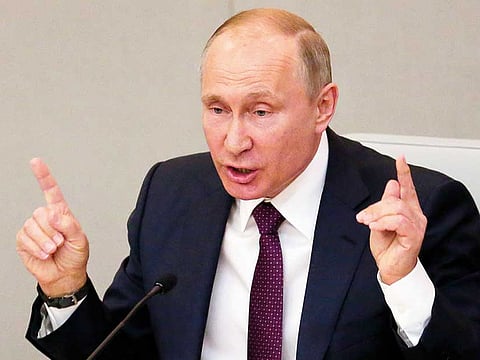Putin’s fan club keeps on growing
As the leader of a revisionist power, the Russian president defies several stereotypes and embodies the politics of grievance

It’s official. Vladimir Putin has just been sworn in for his fourth term as Russia’s president.
One of the most striking moments in the inauguration ceremony came after he took the oath. He shook hands with just three people: Prime Minister Dmitry Medvedev, Patriarch Kirill of the Russian Orthodox Church — and Gerhard Schroeder, the former chancellor of Germany.
This isn’t quite as surprising as it might seem at first glance. Schroeder has long been a supporter of close ties between Moscow and Berlin. He has served on Russian corporate boards and has been instrumental in pushing business deals between the two countries. Small wonder that the Ukrainian foreign minister once described Schroeder as “the most important lobbyist for Putin worldwide”.
Schroeder’s prominent role at the ceremony in Moscow is a reminder that Putin has lots of admirers overseas — and that, if anything, their numbers are growing. During Italy’s recent general election, both of the winning parties — the Five Star Movement and the far-right Northern League — have sought to court the Kremlin. The latter even signed a cooperation agreement with the Russian government, and its leader, Matteo Salvini, described Putin as “one of the best political men of our time”.
This is the same Putin, it is needless to say, who brazenly flouted international law by seizing Crimea, continues to wage war in eastern Ukraine, and has used the power of the internet to sow confusion and chaos within western democracies. Yet, none of this seems to bother his international fan club. If anything, his behaviour merely intensifies their admiration. (Ironically enough, this is happening even as there are signs his popularity at home is starting to dwindle.)
Putin-mania draws on several powerful trends in modern politics. The 21st century — with its economic crises, growing income inequality, and contentious culture wars — hasn’t been kind to liberal democracy. It has revealed a latent authoritarian potential even in some of the world’s most open-minded societies.
Putin, who has now been in power for 18 years, is the strongman par excellence — and that, apparently, has an appeal that cuts across party lines. Europeans breathed a sigh of relief when centrist Emmanuel Macron won last year’s French election, but most analyses overlooked the fact that all three of his challengers — the far-right National Front leader Marine Le Pen; Francois Fillon, a Christian conservative; and Jean-Luc Melenchon, a former Trotskyite — were unabashedly pro-Putin. (In the first round of voting, they combined to win more than twice the vote than Macron did.) In Germany, Putin’s most outspoken fans include both the far-right, anti-immigrant Alternative for Germany (AfD) and the socialist Left Party.
As the leader of a revisionist power, Putin embodies the politics of grievance. The former KGB officer has cast himself as a defender of traditional Christianity, a hardliner on gay rights, and a pugnacious nationalist. His ill-disguised contempt for the European Union and its liberal immigration policies thrills nativists such as Le Pen, Hungarian Prime Minister Viktor Orban, and Milos Zeman, the President of the Czech Republic. Last year, Zeman waved a toy Kalashnikov with the words “at journalists” at a press conference. (Russia, it should be noted, is one of the world’s most dangerous countries for reporters.)
And, of course, United States President Donald Trump — the man with the inexplicable Putin infatuation — has notoriously celebrated the Russian president as a “strong leader”. And members of the Republican Party are faithfully following his lead. A poll last year found that 49 per cent of Trump supporters believed Russia to be either a friend or an ally of the US — despite a growing amount of evidence the Kremlin interfered in American politics. Last year, during the furore over Roy Moore, a Senate candidate from Alabama, one Republican official declared: “If I’ve got a choice of putting my welfare into the hands of Putin or the Washington Post, Putin wins every time.” These American Putin fans conveniently overlook the fact that much of his global popularity is derived from his status as the lodestar of anti-Americanism — which helps to explain why his admirers transcend traditional left-right divides. The Russian president’s diatribes against Nato and alleged US involvement in “colour revolutions” in the former Soviet Union find plenty of sympathy among those who chafe at American dominance.
And then there’s another little secret about the Putin fan club: Racism. Few US conservatives or Euro-populists show comparable enthusiasm for the autocratic leaders of China or Turkey. It is surely no coincidence that Putin is the dictator of choice for white supremacists such as Richard Spencer, who refers to Russia as “the sole white power in the world”. (Spencer’s wife, it should be noted, is an associate of Russian ultranationalist Alexander Dugin). European and American members of the identitarian movement have formed close ties with their Russian counterparts — with Putin’s blessing.
This development bears watching. Analysts often assume Russia lags far behind competing nations when it comes to soft power. Putin’s position as everyone’s favourite despot suggests this isn’t entirely true.
— Washington Post
Christian Caryl is an editor with the Post’s Global Opinions section.


